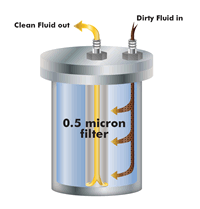Oil Contamination |
||
| Solid Oil Contamination |
Abrasive Solid
Copper, Iron, Silica, Al, Plastic
Non-abrasive solids Carbon, Soot, Dust, Cellulose, Fibre, Rubber, Cotton, Jute, Nylon |
Abrasive Solid
From wear out parts
Non-Abrasive Solids From unhealthy surroundings |
| Liquids Oil Contamination |
Dissolved Water
Invincible is nature
Emulsified Oil turn milky white
Free Water Water layer separates from oil |
Water / Moisture
Along with humid air-intake Leakage in heat exchange Along with fresh oil Cylinder seals and wipers |
| Gases Oil Contamination |
Free Air
Oxygen Hydrogen Carbon Dioxide Sulphur Dioxide Humidity (Water Vapour) |
Air
Intake air through breather While pumping fresh oil |
Water/Moisture
Types of water / moisture:
Dissolved Moisture
- Level of Moisture: Less than 1000 PPM (0.1%)
- Due to continuous ingress of moisture from air breathers
- As a by-product of oil oxidation
Emulsified Moisture
- Level of Moisture: 1000 PPM (0.1%) – 5000 PPM (0.5%)
- When dissolved moisture is not removed for long periods it forms
- Milky white – coloured emulsion
Free Water
- Level of Moisture: More than 5000 PPM (0.5%)
- Due to heat exchanger leakages
- Due to turbine gland seal failures in case of turbines
Possible Risk of Moisture/Water in Oil:
- Reduction in Oil Viscosity: Excess moisture in oil reduces oil viscosity and oil lubrication properties. This is a serious concern and required complete change of oil / dehydration.
- Formation of Acids & Rust: Even low content of moisture of 500 PPM (0.05%) dissolved in oil acts as catalyst to oil decomposition to form acids and metallic oxides (rust). Acids thus formed increase corrosion of metallic surfaces and wearing of rubber seals leading to oil leakages.
- Formation of Sludge: Dissolved moisture in oil acts as catalyst to oil oxidation reaction which leads to form a sticky – gelly like substance called sludge. Sludge in oil is basic cause of valve choking & pump failures
- Deposition of Varnish: Sludge formed in oil due to dissolved moisture gets deposited on metallic surfaces. This coating is tacky and cannot be wiped off. The varnish surfaces are hard & abrasive causing more failures.
- Bacterial Growth in Oil: Emulsified oil facilitates nutrient transport across the bacterial cellular boundary thus to accelerate bacterial growth. Bacterial growth causes frequent choking of filters, plugging of orifices.
Metallic Wear Particles
- Metallic wear particles (of less 10-micron size) are generated by a lubrication system itself during its operation.
- Metallic wear particles are highly abrasive in nature
- Increase of wear particles is highly damaging to machine components
- Wear particles typically cause 50% of all failures
- These multiply due to wear and tear of surfaces of machine components
- The most harmful particles are the ones trapped in the dynamic tolerance like in bearings.
Sludge & Varnish
- Varnish deposits on metal surfaces are “sticky” and difficult to be dissolved or removed.
- Varnish acts as an insulation on metal surfaces; thus creating “hot-spots” prone to thermal failures.
- Varnish causes wear & tear: Varnish surfaces are sticky; so attract more particles to stick on them; thus creating a hard & abrasive layer (sandpaper surface) on metal surfaces which causes accelerated wear in components.
- Increases Valve Malfunctioning: Varnish sticks on valve surfaces making the movement restricted. Thus causing malfunctioning of servo & proportionate valves etc.
- Increases Filter Choking: Varnish sticks on surface type in-line filters, pencil filters and chokes them very fast. Cost of filter replacement increases.
Root Cause to Machine Breakdown
Valve Failure
Combination of Carbon and Water creates Sledges. This Sludge which is sticky gum-like substance chokes the valves and restricts their movement and finally causes Valve Failure.Oil leakage (shown above) and Valve failure causes Machine Breakdown.
Our Solution for Oil Contamination
Micfil ultrafine filters – Oil Purifier System for Oil Contamination
 BETTER LUBRICATION AND LESS WEAR WITHOUT OIL CHANGES
BETTER LUBRICATION AND LESS WEAR WITHOUT OIL CHANGES
- Removes solid contaminants down to 0.5 μm
- Up to 20 times better filter performance than standard filters
- Improves lubrication capability
- Prolongs life span by reducing wear
- Gives better engine output through less friction
- Conventional oil changes are obsolete
- Additives are not filtered out and through ultrafine filtration there is less additive consumption
- Less maintenance and repair costs are required
- Environmental protection is achieved by reducing oil consumption and elimination of waste oil disposal
- Engine manufacturer’s warranty is preserved by law
